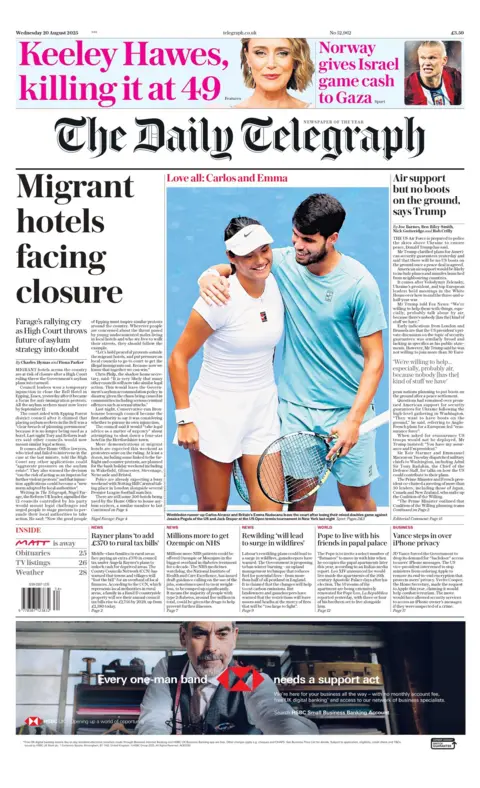In recent news, the UK government’s controversial asylum policy has been thrown into chaos following a High Court ruling that has significant implications for the operation of migrant hotels across the country. The ruling centered on a hotel in Epping, which has now been ordered to evict asylum seekers, leading various newspapers to declare that the government’s migrant hotels policy is in disarray. With headlines such as “Migrant hotels facing closure” from the Daily Telegraph and “Migrant policy in disarray” from the i Paper, the court’s decision marks a pivotal moment in the ongoing debate around immigration and asylum in the UK.
The ramifications of the ruling are profound, as it has left government ministers stunned and has raised concerns that it might pave the way for a flood of similar legal challenges by other councils. The Daily Mail reported that ministers were caught off guard by the ruling, predicting a “deluge” of legal actions that could further complicate the management of asylum seekers currently housed in hotels. Echoing this sentiment, The Sun criticized the government’s handling of the situation, suggesting that it demonstrates a failure to manage the asylum process effectively.
Much of the media coverage focuses on the sentiments of local people and communities who feel that their concerns have long been ignored. The Daily Express, for instance, highlights that the ruling is seen as a significant victory for residents who have protested against the presence of asylum seekers in their area. Nigel Farage, the leader of Reform UK, added his voice to the discussion, commending the bravery of Epping residents and positioning them as champions against what he termed an unjust status quo. His perspective reflects a broader narrative that seeks to paint local opposition in a patriotic light.
In contrast to local support for the ruling, there is evident apprehension among activists and human rights organizations regarding the potential impacts on vulnerable individuals awaiting asylum status. As the Daily Telegraph predicts further protests, critical voices are raising alarms about the implications of displacing individuals who are already in precarious situations. They argue that the ruling undermines the UK’s commitments to protect those fleeing persecution and crises.
The broader implications of the ruling extend beyond Epping’s hotel, as a feeling of uncertainty now looms over migrant accommodations countrywide. The Bell Hotel, where the ruling originated, is reportedly facing immediate closure with just 24 days to comply with the judgment. Many newspapers are describing this situation as a turning point, suggesting that if more hotels face similar judgments, it could dismantle the existing system of housing asylum seekers.
Additionally, amidst this tumultuous climate, there are secondary news stories emerging, including exciting developments in the entertainment world. Notably, Noel Gallagher’s recent expressions of pride in his brother Liam have been featured prominently, illustrating the contrast between political turmoil and lighter cultural topics. The Gallagher brothers’ reunion after a prolonged feud captured media attention, indicating the public’s continued interest in celebrity dynamics as a respite from pressing news.
Simultaneously, the international stage is not devoid of crises, particularly with the ongoing war in Ukraine. Reports indicate a shift in U.S. policy as President Donald Trump confirms that American troops will not be sent to participate in peacekeeping efforts, a stance that aims to appease isolationist sentiments among his supporters. Trump’s reassurances towards European allies following initial promises of American support illustrate a delicate balancing act in foreign policy.
The interplay of domestic policies on asylum, public sentiments, and international relations highlight a complex narrative unfolding in the UK and beyond. As tabloid and broadsheet newspapers present these varying threads, it becomes clear that public discourse is as much about community responses to immigration policies as it is about seeking resolution to global conflicts such as that in Ukraine. The current climate presents pressing questions, not only about policies and operations but about the very fabric of societal values and how nations prioritize human rights amid growing populist sentiments.
The British media landscape serves as a mirror reflecting these multifaceted issues, illustrating how local and global narratives intertwine, challenging audiences to consider both immediate community impacts and broader humanitarian implications in their consumption of news.












